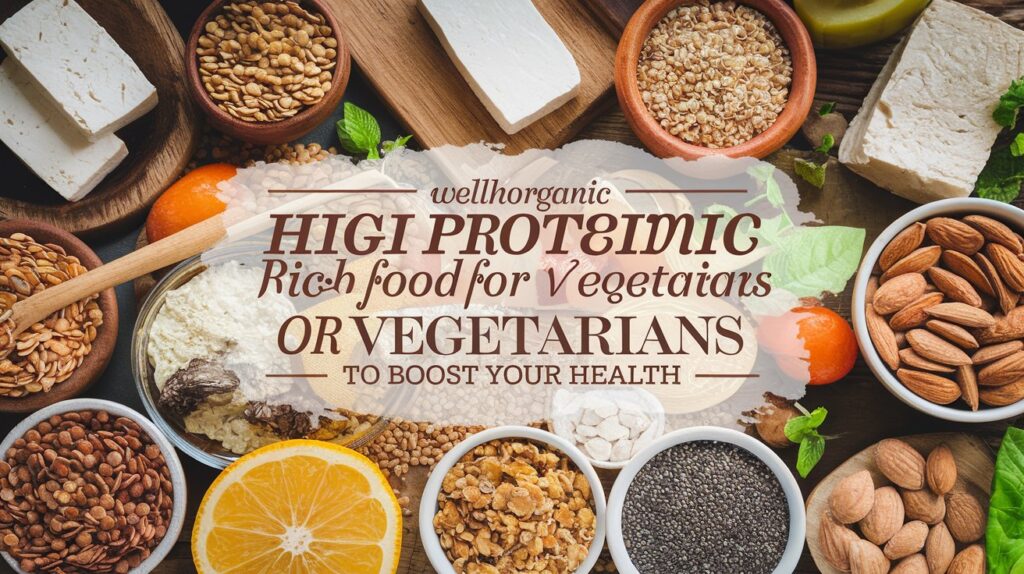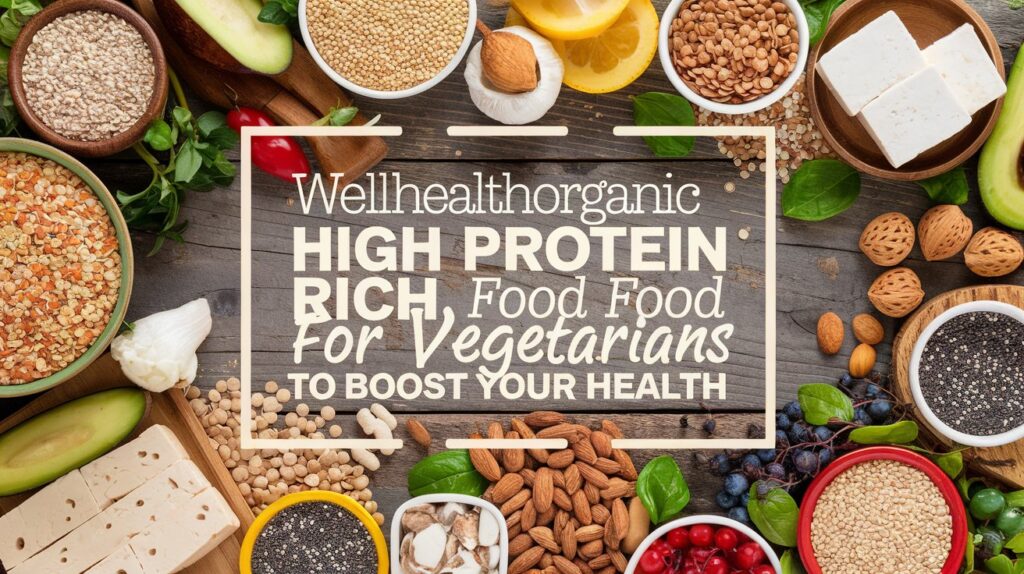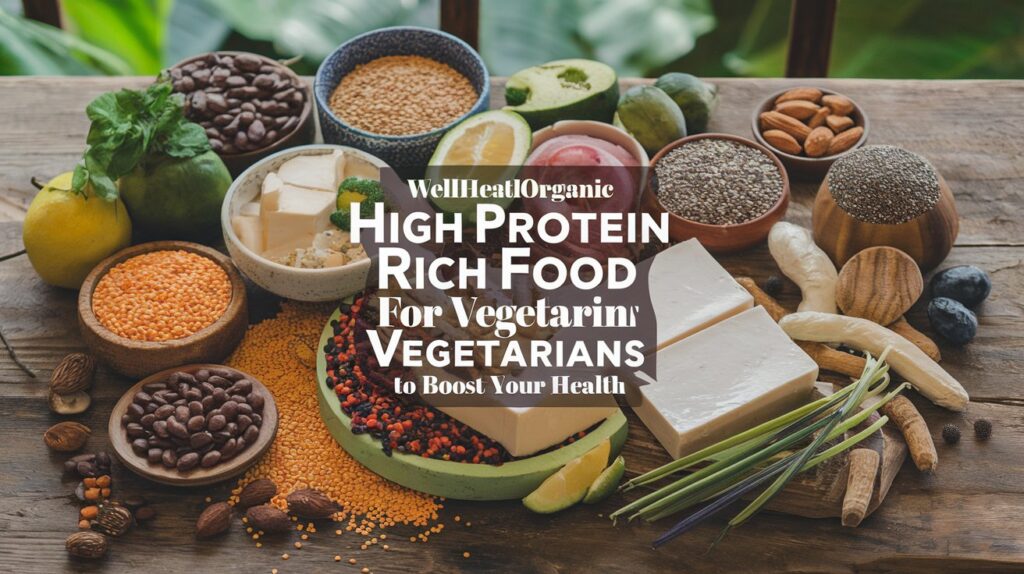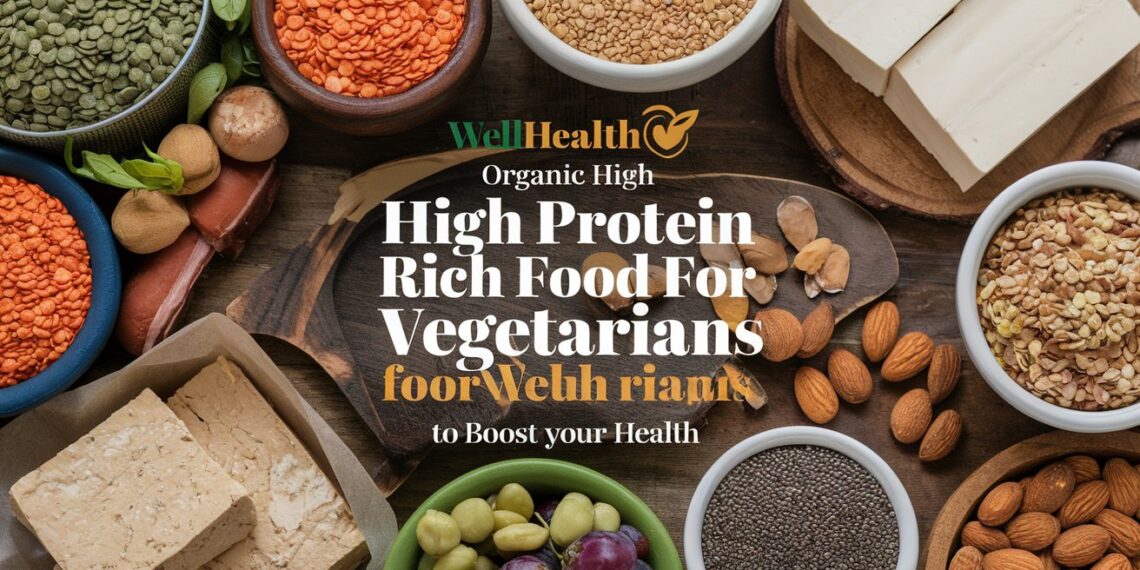Are you a vegetarian looking for ways to increase your daily protein intake naturally?
Do you wonder if plant-based diets can really deliver the high-quality protein your body needs to thrive?
If yes, you’re in the right place. In this guide, we’ll explore the most effective high-protein organic foods that can help vegetarians stay strong, energized, and healthy.
Comprehensive Table: Wellhealthorganic High Protein Rich Food for Vegetarians to Boost Your Health
| Category | Details |
|---|---|
| Main Keyword | Wellhealthorganic High Protein Rich Food for Vegetarians to Boost Your Health |
| Search Intent | Informational; seeking organic, high-protein vegetarian foods to improve health |
| Target Audience | Vegetarians, health-conscious individuals, fitness enthusiasts, organic food seekers |
| Primary Focus | Organic, high-protein vegetarian foods and their health benefits |
| Top Organic Protein Sources | Lentils, Chickpeas, Quinoa, Tofu, Tempeh, Chia Seeds, Hemp Seeds, Almonds, Greek Yogurt (if lacto-vegetarian), Edamame |
| Health Benefits | Muscle maintenance, energy boost, improved metabolism, satiety, overall wellness |
| Common Questions | What are the best organic protein sources for vegetarians? How can vegetarians meet protein needs? Are organic proteins more beneficial? |
| Keyword Variations | High protein vegetarian foods organic, best organic vegetarian protein sources, organic plant-based protein for health |
| Related Long-Tail Keywords | Organic vegetarian foods for muscle gain, top organic vegetarian protein sources for energy, vegetarian protein-rich foods and their benefits (organic) |
| Competitor Domains | Healthline, Medical News Today, WebMD, Vegetarian Times, Veganuary, Thrive Market |
| Content Types Ranking | Informational articles, blog posts, recipe websites, product pages |
| Featured Snippets/PAA | Lists of high-protein vegetarian foods, protein content of specific foods, health benefits of vegetarian protein |
| Latest Trends (2024-2025) | Growth in organic vegetarian food market, increased demand for plant-based proteins, studies on health benefits of organic diets |
| Blog Topic Ideas | The Ultimate List of Organic High-Protein Foods for Vegetarians, Power Up Your Plate: Vegetarian Protein Sources to Enhance Your Health Naturally, Getting Enough Protein on a Vegetarian Diet: The Organic Advantage |
| Image Prompt | A vibrant display of organic vegetarian protein sources (e.g., lentils, quinoa, tofu, nuts) arranged aesthetically with the text “Wellhealthorganic High Protein Rich Food for Vegetarians to Boost Your Health” prominently in the center. |
Why Is Protein So Important in a Vegetarian Diet?
Protein is the building block of your muscles, skin, hormones, and enzymes. Without enough of it, your body can’t repair cells or build new ones.
But here’s the thing: many vegetarians struggle to get sufficient protein because they cut out animal products—the typical sources of protein in many diets.
So, can vegetarians still thrive? Absolutely. But it requires mindful food choices.
Question: What are the best organic high-protein foods for vegetarians that actually work?
Let’s dig in.

Top Organic High-Protein Foods for Vegetarians
These foods are not only packed with protein but are also organic, clean, and eco-friendly.
1. Lentils
Protein Content: 18g per cooked cup
Why It’s Great: Lentils are a staple in many vegetarian diets. They are rich in iron, fiber, and folate and help in maintaining blood sugar levels.
Tip: Use them in soups, dals, veggie patties, or hearty salads.
Question: Can lentils be your main source of protein?
Yes! When combined with grains like rice or quinoa, lentils offer a complete amino acid profile.
2. Chickpeas (Garbanzo Beans)
Protein Content: 15g per cooked cup
Why It’s Great: Chickpeas are versatile and incredibly satisfying. From hummus to roasted snacks to curries, the options are endless.
Tip: Blend them into dips or roast them with spices for a protein-packed snack.
Question: Are chickpeas enough to meet daily protein goals?
Pairing chickpeas with whole grains or nuts boosts their protein efficiency.
3. Quinoa
Protein Content: 8g per cooked cup
Why It’s Great: Unlike many plant-based foods, quinoa is a complete protein, meaning it contains all nine essential amino acids.
Tip: Use it as a base for bowls, salads, or even breakfast porridge.
Question: Is quinoa better than rice for vegetarians?
Absolutely. Quinoa beats rice in protein content and nutritional value.
4. Tofu and Tempeh
Protein Content: Tofu: 10g/100g, Tempeh: 19g/100g
Why It’s Great: These soy-based proteins are highly absorbent, taking on any flavor you cook them with. Tempeh also contains probiotics that support gut health.
Tip: Stir-fry them, bake them, or crumble them into tacos.
Question: What’s the difference between tofu and tempeh?
Tempeh is fermented, giving it a denser texture and stronger flavor, plus more fiber and nutrients.
5. Seitan
Protein Content: 21g per 100g
Why It’s Great: Known as wheat meat, seitan is perfect for those craving a meaty texture. It’s one of the richest plant-based protein sources.
Tip: Use in stir-fries, skewers, or sandwiches.
Question: Is seitan safe for gluten-sensitive people?
No. Since it’s made from wheat gluten, it’s not suitable for anyone with celiac disease or gluten intolerance.
6. Nuts and Seeds
Protein Content: Varies – Chia seeds (5g/2 tbsp), Hemp seeds (6g/2 tbsp), Almonds (6g/28g)
Why They’re Great: Nuts and seeds are nutrient-dense, offering healthy fats, fiber, and minerals along with protein.
Tip: Add to smoothies, oatmeal, or sprinkle over salads.
Question: Can you rely on nuts and seeds for protein?
They’re great supplements but may be too calorie-dense to be your sole protein source.
7. Greek Yogurt (Organic, Plain)
Protein Content: ~10g per 100g
Why It’s Great: Greek yogurt is high in calcium, probiotics, and protein. Just make sure it’s unsweetened and organic.
Tip: Use as a base for smoothies or parfaits.
Question: Can Greek yogurt help build muscle?
Yes, especially when consumed post-workout—it promotes muscle recovery and growth.

How to Create a Well-Rounded Protein-Rich Vegetarian Diet
Just eating protein isn’t enough. You need variety and balance.
Combine Different Proteins:
- Lentils + Rice = Complete Protein
- Chickpeas + Whole Grain Bread
- Quinoa + Veggies + Tofu Stir-fry
Question: Why combine plant proteins?
Because not all plant foods contain every amino acid. But when combined strategically, they give you the full set your body needs.
Why Go Organic with High-Protein Foods?
Organic foods are grown without harmful pesticides, synthetic fertilizers, or GMOs. They’re better for your health and the planet.
Question: Do organic foods have more nutrients?
Some studies suggest they may have higher antioxidant levels and fewer chemicals. Plus, they taste better!
Sample One-Day Meal Plan Using These Ingredients
Breakfast:
- Quinoa porridge with chia seeds, almonds, and a banana
Lunch:
- Lentil and chickpea salad with olive oil, lemon juice, and quinoa
Snack:
- Greek yogurt with hemp seeds and berries
Dinner:
- Stir-fried tempeh with broccoli, bell peppers, and brown rice
Late Snack:
- Roasted chickpeas or a handful of almonds
Question: Is this enough protein for the day?
Yes! This meal plan offers 60-90 grams of protein, more than enough for most adults.
Final Thoughts: Boost Your Health the Natural Way
Incorporating wellhealthorganic high protein rich food for vegetarians to boost your health is more than just a dietary trend—it’s a lifestyle upgrade.
With the right foods, you can achieve your health goals without sacrificing your vegetarian values.
From lentils and quinoa to tofu and nuts, these foods offer the natural fuel your body craves.
So next time someone asks if vegetarians can get enough protein, you’ll know exactly what to say—and eat.
Stay healthy, stay strong, and stay plant-powered!

Related Keyword Mentions:
- wellhealthorganic high protein rich food for vegetarians to boost your health
- high protein vegetarian foods
- organic protein-rich plant-based diet
- natural vegetarian protein sources
If you found this guide helpful, share it with fellow vegetarians or health-conscious friends. The journey to better health is better together.






